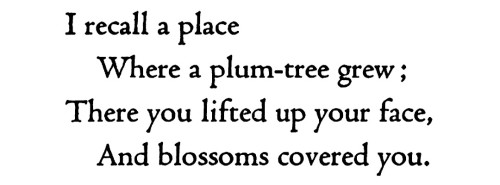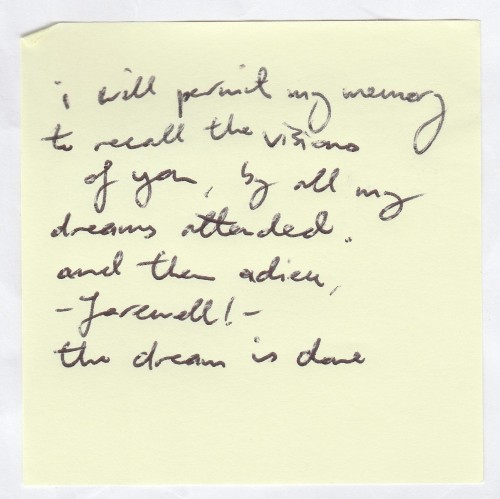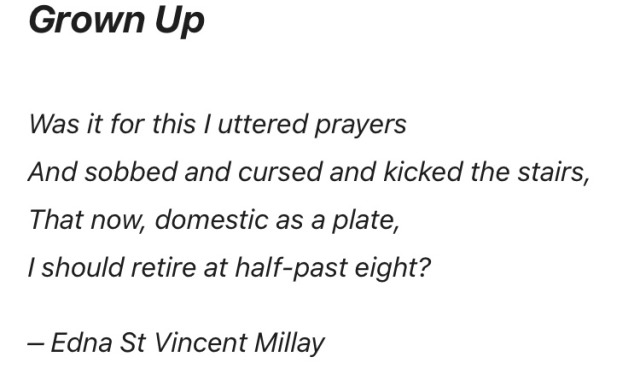#edna st vincent millay
by Edna St. Vincent Millay
I am not resigned to the shutting away of loving hearts in the hard ground.
So it is, and so it will be, for so it has been, time out of mind:
Into the darkness they go, the wise and the lovely. Crowned
With lilies and with laurel they go; but I am not resigned.
Lovers and thinkers, into the earth with you.
Be one with the dull, the indiscriminate dust.
A fragment of what you felt, of what you knew,
A formula, a phrase remains,–but the best is lost.
The answers quick and keen, the honest look, the laughter, the love,–
They are gone. They are gone to feed the roses. Elegant and curled
Is the blossom. Fragrant is the blossom. I know. But I do not approve.
More precious was the light in your eyes than all the roses in the world.
Down, down, down into the darkness of the grave,
Gently they go, the beautiful, the tender, the kind;
Quietly they go, the intelligent, the witty, the brave.
I know. But I do not approve. And I am not resigned.
Arkhip kuindzhi
* * * * *
“Into the darkness they go, the wise and the lovely. ”
~Edna St. Vincent Millay
Post link
Adjective
[urst-hwahyl, -wahyl ]
1. former; of times past:
erstwhile friends.
Adverb
2. Archaic. formerly; erst.
Origin:
The adverb erstwhile has been part of English since the 16th century, but it is formed from two words that are much older. It comes from the Old English words ær, meaning “early,” and hwīl, which has much the same meaning as the modern word while. (The English word ere, meaning “before,” is also descendant of ær.) The adjective erstwhile, as in erstwhile enemies, joined the language around 1900.
“After all, my erstwhile dear, my no longer cherished, need we say it was no love, just because it perished?“
- Edna St. Vincent Millay
by Edna St. Vincent Millay
What lips my lips have kissed, and where, and why,
I have forgotten, and what arms have lain
Under my head till morning; but the rain
Is full of ghosts tonight, that tap and sigh
Upon the glass and listen for reply,
And in my heart there stirs a quiet pain
For unremembered lads that not again
Will turn to me at midnight with a cry.
Thus in winter stands the lonely tree,
Nor knows what birds have vanished one by one,
Yet knows its boughs more silent than before:
I cannot say what loves have come and gone,
I only know that summer sang in me
A little while, that in me sings no more.
by Edna St. Vincent Millay
I looked in my heart while the wild swans went over.
And what did I see I had not seen before?
Only a question less or a question more;
Nothing to match the flight of wild birds flying.
Tiresome heart, forever living and dying,
House without air, I leave you and lock your door.
Wild swans, come over the town, come over
The town again, trailing your legs and crying!
Pity me that the heart is slow to learn
What the swift mind beholds at every turn.
Edna St. Vincent Millay, The Harp-Weaver and Other Poems
I will permit my memory to recall the visions of you, by all my dreams attended. And then adieu, -farewell!- the dream is done // Edna St. Vincent Millay.
Post link
If I should learn, in some quite casual way,
That you were gone, not to return again—
Read from the back-page of a paper, say,
Held by a neighbor in a subway train,
How at the corner of this avenue
And such a street (so are the papers filled)
A hurrying man—who happened to be you—
At noon to-day had happened to be killed,
I should not cry aloud—I could not cry
Aloud, or wring my hands in such a place—
I should but watch the station lights rush by
With a more careful interest on my face,
Or raise my eyes and read with greater care
Where to store furs and how to treat the hair.
Sonnet V, Renascence and Other Poems, Edna St. Vincent Millay
(1917)
And You as Well Must Die, Beloved Dust
And you as well must die, beloved dust,
And all your beauty stand you in no stead;
This flawless, vital hand, this perfect head,
This body of flame and steel, before the gust
Of Death, or under his autumnal frost,
Shall be as any leaf, be no less dead
Than the first leaf that fell,—this wonder fled.
Altered, estranged, disintegrated, lost.
Nor shall my love avail you in your hour.
In spite of all my love, you will arise
Upon that day and wander down the air
Obscurely as the unattended flower,
It mattering not how beautiful you were,
Or how beloved above all else that dies.
Edna St. Vincent Millay
Love Is Not All
Love is not all: it is not meat nor drink
Nor slumber nor a roof against the rain;
Nor yet a floating spar to men that sink
And rise and sink and rise and sink again;
Love can not fill the thickened lung with breath,
Nor clean the blood, nor set the fractured bone;
Yet many a man is making friends with death
Even as I speak, for lack of love alone.
It well may be that in a difficult hour,
Pinned down by pain and moaning for release,
Or nagged by want past resolution’s power,
I might be driven to sell your love for peace,
Or trade the memory of this night for food.
It well may be. I do not think I would.
Edna St. Vincent Millay
I, Being Born a Woman and Distressed
I, being born a woman and distressed
By all the needs and notions of my kind,
Am urged by your propinquity to find
Your person fair, and feel a certain zest
To bear your body’s weight upon my breast:
So subtly is the fume of life designed,
To clarify the pulse and cloud the mind,
And leave me once again undone, possessed.
Think not for this, however, the poor treason
Of my stout blood against my staggering brain,
I shall remember you with love, or season
My scorn with pity, - let me make it plain:
I find this frenzy insufficient reason
For conversation when we meet again.
Edna St. Vincent Millay
I shall die, but
that is all that I shall do for Death.
I hear him leading his horse out of the stall;
I hear the clatter on the barn-floor.
He is in haste; he has business in Cuba,
business in the Balkans, many calls to make this morning.
But I will not hold the bridle
while he clinches the girth.
And he may mount by himself:
I will not give him a leg up.
Though he flick my shoulders with his whip,
I will not tell him which way the fox ran.
With his hoof on my breast, I will not tell him where
the black boy hides in the swamp.
I shall die, but that is all that I shall do for Death;
I am not on his pay-roll.
I will not tell him the whereabout of my friends
nor of my enemies either.
Though he promise me much,
I will not map him the route to any man’s door.
Am I a spy in the land of the living,
that I should deliver men to Death?
Brother, the password and the plans of our city
are safe with me; never through me Shall you be overcome.-Edna St. Vincent Millay

But the rose is quiet and pale. She has forgotten us all. Even Spring, even death.
~Edna St. Vincent Millay
“L'infanzia è il regno in cui nessuno muore.”
_ Edna St. Vincent Millay
“I am going to make you love me. Sweetheart, what I mean is: I want to sit on the edge of your bed while you have your breakfast - I want to laugh with you, be incredibly silly, be incredibly happy, be like children, and I want to kiss you more than anything in the world.”— Edna St. Vincent Millay in a letter to George Dillon, c. 1929 (via pinkballerinas)
“You and I have almost achieved that which is never achieved: we sit in each other’s souls.”
—Edna St. Vincent Millay, in a letter to Arthur Davison Ficke, 24 January 1922







